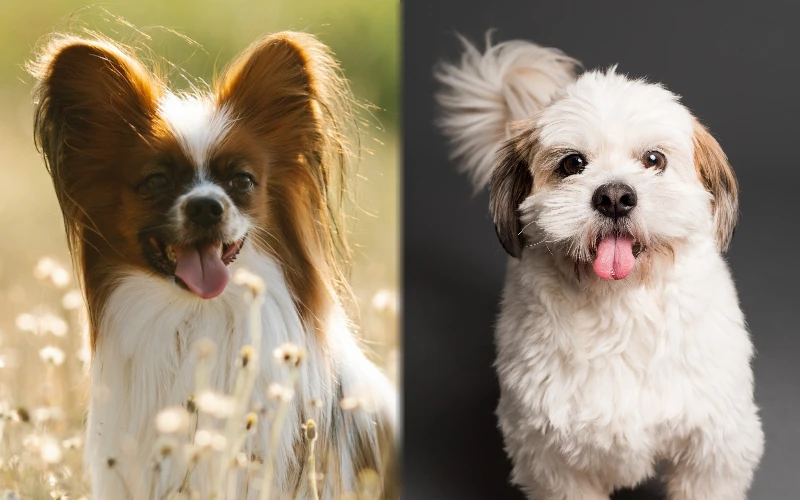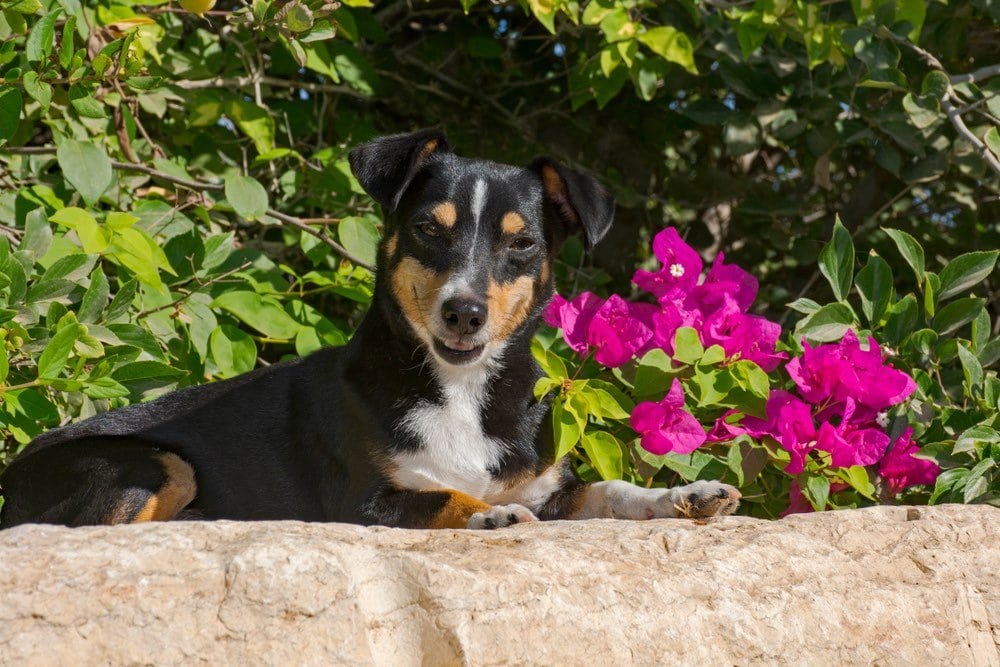Papastzu (Shih Tzu Papillon Mix): Pictures, Care Guide, Temperament & Traits

Updated on

Click to Skip Ahead
The Papastzu, a delightful blend of the Papillon and Shih Tzu breeds, boasts an appealing aesthetic combined with a temperament that makes it a beloved pet in many households. With unique characteristics inherited from its parent breeds, the Papastzu has rapidly gained popularity among dog lovers. Come along, and let’s take a closer look at this endearing canine companion!
| Height: | 8–11 inches |
| Weight: | 9–15 pounds |
| Lifespan: | 11–15 years |
| Colors: | White, brown, black |
| Suitable for: | Moderately active families, families with older children |
| Temperament: | Loyal & loving, gentle, energetic, playful |
The fascinating Papastzu breed is an intriguing mix of two distinguished breeds—the Papillon and the Shih Tzu. With the Papillon’s intelligence and the Shih Tzu’s charm, the Papastzu is a unique blend many dog owners find irresistible. Loyalty, friendliness, and intelligence are among the core traits that make this breed so beloved.
Papastzu Characteristics
Papastzu Puppies
Papastzu puppies are known for their vivacious energy and irresistible charm. These adorable puppies, with their butterfly-like ears and expressive eyes, have an enchanting way of capturing hearts. Since they are a relatively rare crossbreed, finding a Papastzu puppy may take a bit of time and effort.
Potential owners should make sure to seek out a reputable breeder who is well-versed in the health and lineage of both the Papillon and Shih Tzu breeds. Upon bringing a Papastzu puppy home, you will find that they are full of curiosity and always ready for play.
Their lively personalities and zest for life make them an endless source of fun and laughter. As long as they are bred responsibly, Papastzu puppies grow up to be healthy, happy companions that bring a sense of joy and warmth to any home.

Temperament & Intelligence of the Papastzu 🧠
Inheriting some of the best characteristics of their parent breeds, Papastzus are known for their affectionate temperament and keen intelligence. These dogs are very sociable and thrive on the companionship of their human family. Their lovable nature and eagerness to please make them an easy fit in any loving home.
One of the most defining features of the Papastzu is their impressive intellect. Thanks to the intelligence inherited from their Papillon parent, Papastzus have a quick and eager mind. But one aspect Papastzus didn’t inherit from their parent breeds is vocalization—they’re nowhere near the barkers that their parents are known for.
If your Papastzu does take to barking excessively, you’ll be pleased to know that they are fast learners. As such, they can quickly grasp new commands or tricks. So, putting a stop to unwanted yapping can be accomplished in a short time.
Not only that but training is a joy compared to many other breeds. Just remember that their intelligence also means mental stimulation is needed on the daily to prevent boredom, which can lead to acting out and unwanted behavior.
Are These Dogs Good for Families? 👪
Without a doubt, Papastzus make excellent family pets. Their friendly and outgoing personality makes them well-suited to a family environment. They are good-natured and gentle dogs that love to be part of family activities.
The Papastzu’s active and playful demeanor makes them great companions, and their protective nature means they’ll always be watching out for their family. Younger children and toddlers, however, may give this breed trouble due to its small size.
As such, it’s always a good idea to supervise interactions between Papastzus and very young children to ensure neither accidentally hurts the other. As always, it is important to teach children how to interact respectfully and gently with dogs.
Does This Breed Get Along With Other Pets?
Yes, the sociable Papastzu usually gets along very well with other pets. They inherit a tolerant and easygoing nature from their Shih Tzu parent, which makes them generally accepting of other animals. However, like all dogs, individual temperaments can vary.
While they’re usually good-natured around other dogs, it’s important to remember that early socialization is key. Properly introducing your Papastzu to other pets in the home and exposing them to a variety of experiences and animals from a young age will help ensure they grow up to be well-rounded, sociable adults.
With the right introduction and socialization, Papastzus can share a home with a variety of other pets, from other dogs to cats and beyond. Start early, and you can look forward to a harmonious household.
Things to Know When Owning a Papastzu:
Food & Diet Requirements 🦴
When it comes to diet, Papastzus require nutritionally balanced meals tailored to their size, age, and activity level. Opt for high-quality dog food that supplies the essential nutrients in the right proportions. It’s beneficial to include a blend of proteins, carbohydrates, fats, vitamins, and minerals in their diet.
The specific amounts will vary based on their individual needs. Consult with your vet for personalized feeding guidelines, as factors like weight, metabolism, and overall health can play a part in determining their dietary needs.
Exercise 🐕
Papastzus are brimming with energy and need regular exercise to stay happy and healthy. Incorporate daily walks and ample playtime into their routine. They’ll also enjoy engaging activities like puzzle toys or interactive games, which will provide not only physical exercise but also mental stimulation.
Remember, the frequency and intensity of exercise should be aligned with their age, health condition, and energy levels. This is a very important guideline, as too much or too little exercise can be a detriment to your furry friend. So be sure to adjust accordingly.
Training 🎾
When it comes to training, Papastzus are a delight. Their innate intelligence, combined with an eagerness to please their owners, makes them responsive to positive reinforcement training techniques.
Use rewards like treats, praise, or additional playtime to motivate and encourage them. And as mentioned previously, you should always begin training sessions early while they’re still puppies. Strive to keep the sessions short and fun to maintain their interest.
Grooming ✂️
Papastzus inherit their fluffy coats from their parent breeds, which require regular upkeep. To prevent matting and keep their fur looking neat and shiny, you need to brush it daily. Regular bathing is important, but be careful not to over-bathe. Doing so can strip the natural oils from their fur.
Routine nail trimming is necessary to prevent overgrowth and splitting, and their ears need to be checked and cleaned regularly to avoid infections.
Health and Conditions ❤️
- Intervertebral Disc Disease
- Von Willebrand’s Disease
- Cataracts
- Progressive Retinal Atrophy (PRA)
- Hydrocephalus
- Familial Nephropathy
- Follicular Dysplasia
- Eyelid Defects
- Mitral Valve Dysplasia
- Patellar Luxation
- Exposure Keratopathy Syndrome
- Brachycephalic Syndrome
Male vs Female
Male and female Papastzus are similar in their affectionate and lively temperament. Size differences can occur, with males tending to be slightly larger than females, but this can vary. Always remember that individual personality traits can also vary widely within a breed and getting to know your specific pet’s personality is key.
3 Little-Known Facts About the Papastzu
1. The Papastzu Is a Relatively New Mixed Breed
Although the Papillon and Shih Tzu have long histories, the Papastzu itself is a relatively new blend. Its first introduction occurred as early as the 1990s. It’s also a breed that quickly gained popularity.
2. Papastzus Are Incredibly Adaptable
They’re happy in an apartment or a house with a yard if they get the right amount of exercise and companionship. With the proper mental and physical stimulation, you can take this breed just about anymore, and it will be content.
3. Papastzus Have a “Butterfly” Lineage
The Papastzu’s Papillon parent breed is named after the French word for butterfly, referring to the breed’s distinctive butterfly-like ears. Papastzu ears are unmistakable, giving the breed a familiar but original trait that’s all its own.
Final Thoughts
The Papastzu makes a wonderful pet for a wide variety of households. With its engaging personality, adaptability, and manageable size, the Papastzu fits in well with active families, apartment dwellers, and even multi-pet households.
Whether you’re captivated by its adorable look, its loyal and loving nature, or its intelligence, the Papastzu stands out as a dog breed that is hard to resist. Investing in a Papastzu not only brings a pet into your home, but it also brings in a family member who is sure to offer affection, companionship, and plenty of fun-filled moments.
Featured Image Credit: Left – Blue Bird, Pexels | Right – Goochie Poochie Grooming, Pexels












